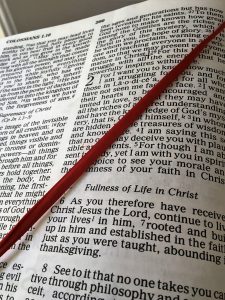Luke 4:31-37
Amazement came over them all, and they were saying to one another, “What is this message? For he commands the unclean spirits with authority and power, and they come out!” (Luke 4:36).
Luke next records events from one day in Jesus’ life and ministry. By the leading of the Holy Spirit, he borrows from what Mark wrote in Mark 1:21-39. In his typical manner, Luke has placed this material after something that happened later. This section (Luke 4:31-44) explains the kind of mighty works that Jesus did in Capernaum that he referred to in Luke 4:23. What did Jesus do in his new hometown of Capernaum?
First, he taught with authority (4:31-32). Capernaum was a prosperous fishing and farming community on the north side of Lake Galilee. In addition, it was also located on a trade route, and as such, tax collectors operated from there. This situation would provide a springboard for Jesus to call the men who would become the apostles. Look for opportunities to serve the Lord in the places where you live.
The foundation of Christ’s ministry was his teaching, his words. He taught about God and his kingdom (God’s saving reign that had arrived), cf. 4:43. This is quite different from how most churches in the west have done their business for many years. Jesus did not start with programs and people pleasing messages to gather hearers. The Lord Jesus declared the truth to people. He required inward change, a change that required people to think about God in their lives with an eternal perspective. At the same time, he offered hope from the one true God. People in our time desperately need to hear the words of truth and hope.
Second, he acted with authority (4:33-35). As the people remarked about Christ’s teaching, an unclean spirit, a demon, disrupted the meeting with loud shrieks. “Go away! What do you want with us, Jesus of Nazareth? Have you come to destroy us? I know who you are—the Holy One of God!” (Luke 4:34 NIV). Can you imagine what this felt like? During a time of worship of God, an evil spirit made his presence known. Everyone in attendance, except for Jesus, must have been shocked and disturbed. But Jesus knows the hearts of all in every worship service. He knew the demon was lurking, though others did not.
Jesus also knew the authority given to him by God the Father to set the oppressed free (4:18). He did not hesitate to use it, unlike many political leaders in our country who refuse to act against rioters and looters, because they fear political backlash. (They will answer to God on Judgment Day for their heinous failure to do their duty.) Jesus acted immediately to deliver the oppressed man and to cast out the demon. He had supreme power along with his authority. He ordered the demon out, and also prevented it from harming the man.
Third, the people recognized his authority (4:36-37). People in the west might dismiss demonic oppression and possession as myths of primitive people. People in Bible times did not. Neither do people in other parts of the world who have encountered demonic activity. Neither should people in the west who sadly try to sweep every abnormality under the human made carpet of “mental illness”. Some people sadly do have medical, emotional, and psychological issues that do require skilled treatment and medicine. But that does not rule out the existence of the demonic, unless you are closed-minded and in denial of the supernatural.
That day in Capernaum, the people confessed the authority and power of Jesus Christ. They also spread this news about Jesus to other areas. What news about the authority and power of Christ have you experienced? Do you spread that news? Restore the supernatural in your world and life view. In the process, may you again find hope in these desperate times!
Grace and peace,
David

 When we read the Four Gospels, we should remember that the evangelists were not writing biographies. Their object was not to write a “life of Christ” but to tell the good news about Jesus the Messiah. As they wrote about the story of God’s glory in Christ, they chose events from his earthly ministry and selections from his words to display his glory that is good news for us. This knowledge will help us as we explore Matthew 8-9.
When we read the Four Gospels, we should remember that the evangelists were not writing biographies. Their object was not to write a “life of Christ” but to tell the good news about Jesus the Messiah. As they wrote about the story of God’s glory in Christ, they chose events from his earthly ministry and selections from his words to display his glory that is good news for us. This knowledge will help us as we explore Matthew 8-9. 2 Peter 1:20-21
2 Peter 1:20-21 Luke 5:17-26
Luke 5:17-26